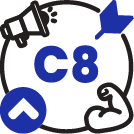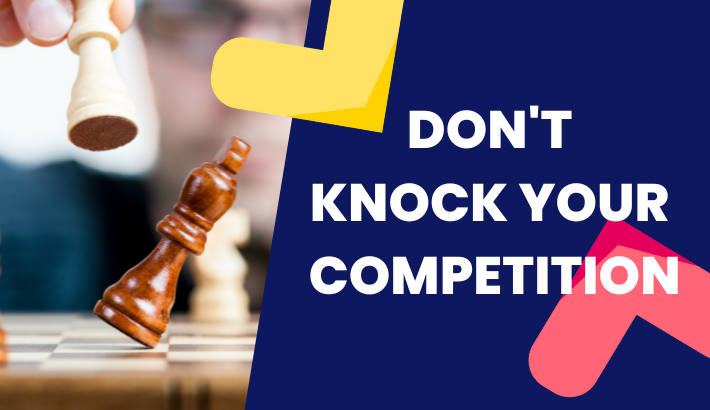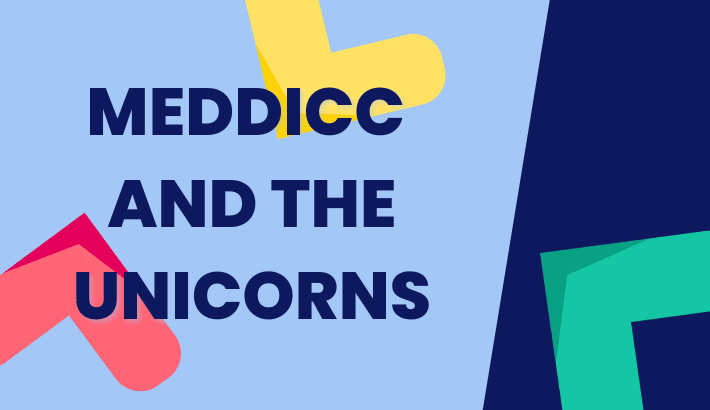This is an excerpt from ‘MEDDICC – The Book’.
What defines an elite salesperson?
The shortest answer I can give to this question is simply:
"Forecast Accuracy.”
Sure, not all accurate forecasters are elite sellers, but all elite sellers are accurate forecasters.
To be elite, you need to have a particular set of attributes that we will cover in this chapter. Among those attributes, you have to be efficient. More specifically, to be elite, you have to be a relentless qualifier.
Relentless Qualifiers
Elite sellers value their time, and therefore, they relentlessly qualify their deals to make sure they are worth their time.
Having a focus on efficiency will increase your productivity because you will be focusing your time on good deals. It also means you exude an air of confidence that your customers will recognize as you valuing your time, perhaps because you have so many customers queuing up to do business with you.
Learning this is one of the hardest things for sellers to grasp. Some never do. We all know that seller who chases after every opportunity like an over-excited Dalmatian pup chases after a stick, then a duck, then a stick, then whatever looks shiny next.
MEDDICC forces sellers to ask themselves the hard qualification questions about their deals. Even the most unfocused, ‘happy eared’ sellers will find it hard to argue with MEDDICC’s conclusions about their deals.
Sales is Performance-Based
Selling is a performance-based profession just like a sport, and like any sport, some factors consistently lead to success in sellers just as they do in athletes. I have been fascinated by this concept for a long time. It could probably be the subject of an entire book on its own, but I have distilled it down into five categories of performance-related attributes:
-
Intelligence
-
Hard Working
-
Always Learning
-
Practice and Preparation
-
Process
Let’s go a little deeper on each one:
1. Intelligence
This one is undeniably a part of any seller’s success. Many factors equate to intelligence in sellers, but it predominantly comes down to ICE:
-
IQ
-
Curiosity
-
EQ (Emotional Intelligence)
Being naturally high in intelligence is fundamental to a seller’s success rate as intelligence will not only help sellers to establish and understand the circumstances they find themselves in quickly, but they will also hold high credibility with their customers as they are more likely to be seen as a trustworthy authority on solving their pains.
Sellers can improve all three ICE attributes. You can enhance your perceived IQ by learning more about business, your industry, and your solution. Focusing on trying to be more curious will give the impression of having a higher EQ.
A critical component of being curious is listening, which also relates to how your EQ will be perceived.
2. Hard Working
I used to play football for my local team and in the locker room was a sign across the back wall that said:
Hard work beats talent when talent doesn’t work hard.
I loved that quote. It was especially true for me as I was never the most talented footballer; I would say that the only reason I held my place in the teams I played for was how hardworking I was.
I could say the same for my sales career after building a successful early career in selling software solutions to SME’s where I got my lucky break with an interview for an up and coming software company called Kontagent. Ahead of the interview, I devoured every single piece of data I could find on them. I genuinely think I knew more about the company than the newly appointed sales leader who was interviewing me. Unfortunately, I never got past the first interview. This wasn’t some grand injustice; I didn’t yet have the experience for the role. However, as part of my obsessive research-level ahead of the interview, I reached out to a seller in the US to ask for interview advice. He replied after I had my interview with a very blunt:
“I wouldn’t bother. We only seem to hire people from Oracle.”
“Oracle?!” I thought. I assumed Oracle only made databases at the time. However, after further exploration, I learned that they had an up-and-coming SaaS business, and I reached out to a recruiter thinking to myself:
“If I want the cool job like Kontagent, I’ve got to do my time at Oracle.”
My timing couldn’t have been better; Oracle was on a mission to grow its SaaS business, and I was invited to an ‘Assessment Day,’ which can only be described as ‘The Apprentice’. It was a day-long event where over 80 candidates were assessed for a role in Oracle. Again, my work ethic helped me prevail as I felt I scored particularly well on the presentations where I was able to prepare well.
The final stage with Oracle was an interview with the VP of Sales, accompanied by two people from the recruitment team and my hiring manager.
In the session, the VP highlighted the relevant education gaps in my resume; specifically that there weren’t any qualifications (I was a high school dropout). The VP said:
“Oracle is a learning company, and I need to be able to see some proof that you can learn.”
Fortunately, I had self-taught myself to build websites and demonstrate some live sites that quickly rectified the VP’s concern. However, after all of that, after a whole week of preparation and a day filled with various exercises and tests, I almost blew it by not closing the VP at the end of the interview:
VP: “OK, I think I have asked you all I need to know. Do you have any questions for me?”
Me: “Um no, thank you. I think you have answered all the questions I have.”
VP: “Are you sure there isn’t a question you would like to ask me before we finish?”
Me: “Err,” vigorously looks at notes, “well err, what is your biggest challen––”
VP: cuts me off “No. I am not going to answer that…. There is a question you must want to ask me.”
Me: “OH! Right, yes… OK, are there any concerns you have seen from our conversation or the sessions today that make you feel like I wouldn’t be able to fulfil the role here at Oracle?”
VP: “Right, thank you. Gets up and leaves.
I got the job at Oracle, but I was vastly out of my depth. My role was to sell Enterprise Resource Planning (ERP) software to the most prominent organizations in the UK. It was one of the most complex sales with some of the most complex customers.
I was never going to hit my ERP target, but I worked hard and found a single opportunity to show my potential to other business units. A manager asked me to transfer to his team where I could find some success selling marketing solutions that were much easier to understand. I found success, and the same headhunter that had approached me for the Kontagent role just over two years earlier got in touch about a position at a company called Sprinklr.
Sprinklr was everything I loved about Kontagent and more. I had always been interested in the social media space, and Sprinklr had a much stronger proposition and a brighter future. I took the same level of preparation into the interviews with Sprinklr as I did Kontagent and Oracle and got the job.
Sprinklr was where I first learned MEDDICC, and their investment in me set me on the path of success I have been on and, ultimately, led me to write this book.
The moral of this story is a simple one – hard work. Without the hard work going into the Kontagent role, I’d never have found out that startups like Kontagent and Sprinklr like to hire people from Oracle, and I’d never have gone to do my ‘time’ there, nor would I have gotten the job at Oracle without hard work. After all, there was very little evidence that I had the intelligence for those roles at the time.
3. Always Learning
Elite sellers know that selling is a science and an art. No scientist or artist ever stops learning, and neither will a seller.
In his book How Rich People Think, Steve Siebold interviewed 1,200 of the world’s wealthiest people on their habits. One commonality was that they were all relentless readers.
No matter where you look, you will find a correlation between increasing knowledge and success, and you don’t just have to read. Thanks to the internet, sellers can now learn from audiobooks, podcasts, Ted Talks, YouTube, Masterclass, and hundreds of other resources.
Often, sellers will be within teams with other sellers, and if the teams are well organized, there are likely to be sessions such as deal reviews where sellers can drop in to learn from their peers’ experiences.
Today, there are even technology platforms that automatically record customer calls, pick out keywords, and sentiments from the conversation. Elite sellers can review their calls to spot areas for improvement. They can ask their peers for feedback on the sessions and listen to their colleagues’ calls to learn from their interactions.
4. Practice and Preparation
Elite sellers, just like elite athletes, spend hours practicing. Before a tournament, an elite tennis player will practice their serve over and over. They wouldn’t turn up to a match and start practicing with their opponent. But, sellers do this all of the time:
Sellers spend hours researching their customers, doing discovery, and subsequently compiling the information into a proposition that they can present without practicing it or getting feedback from their peers.
”We practice our presentations on our customers.”
Sellers sometimes spend months working on a deal. They get to a crunch point where they are having a critical conversation with a department like Procurement, and they roll up without having prepared for – or practiced – what may happen. The result is that they get eaten alive by Procurement who have conversations with sellers every day.
”We practice our negotiations on our customers.”
Think of the last time a customer raised an objection with you. The chances are you did an OK job of answering it, but imagine if you could pause and rewind time to answer it again. I bet the second time of explaining it, you would be more convincing and articulate. This is precisely what you should practice for.
You can and should practice on your own. For a presentation, in the book The Art of The Start by Guy Kawasaki, he states that a business pitch only begins to sound truly solid after 25 deliveries. If it is a presentation of your solution, you may not need to go into such depth, but there should be an amount of personalization within the presentation that requires practice.
For other engagements that aren’t presentations, you should prepare. Ahead of every sales engagement, ask yourself questions like:
-
What outcome do I want from this engagement?
-
Who else do I want to speak to?
-
Have I set the expectation ahead of time? Agenda, etc.?
-
What objections could be raised?
-
What messages do I need to reinforce?
5. Process
Without exception, every single elite seller I have ever known is process-driven. Elite sellers understand that sales is a science as much as an art. The most effective way to succeed is to follow the anatomy of success, which should correlate to how your organization has structured its sales process.
By contrast, the worst sellers I know aren’t process-driven. Their definition of following a process starts and stops with updating the deal stage within their CRM system.
Be a Plotter not a Pantser
I recently learned two terms that writers have to describe novelists:
Plotters and pantsers.
Plotters plan out their novel before they write it, whereas pantsers fly by the seat of their pants; pretty much meaning they make it up as they go along.
While Stephen King and George R. R. Martin write fantastic fiction novels by being pantsers, I’m sure you’ll agree that there is little room for fiction in your forecast.
Elite sellers are plotters.
Qualifying Out
As mentioned at the beginning of this chapter, elite sellers are relentless qualifiers. They know that the best way to protect their time is by qualifying out of opportunities that don’t meet their qualification standards.
I once knew a sales leader who wanted a deal stage to be added to their CRM called ‘Closed Lost with Hope.’ Deals at this stage would be omitted from the forecast, but would still be worked on by sellers in the (desperate) hope they come back to life. I think this is a terrible idea; if you are a seller and find yourself in the emergency room doing CPR on your deals, there is something very wrong with your qualification process.
When you start relentlessly qualifying your deals and subsequently qualifying out of those you deem as unqualified, you will notice two surprising by-products:
-
Customers will increase their interest and self-qualify themselves. Sometimes inexperienced buyers pretend they are less interested than they are, and by calling their bluff, you’ll force them to show their hand.
-
Those where you have correctly qualified out will often come back to you when they are ready. If you hadn’t qualified, you might have pursued this organization incorrectly and burnt up sales capital to get them to commit when they weren’t qualified to do so.
Summary
In summary, each attribute listed in this chapter can help a seller towards being good. However, as per the following examples, without having all five of the elite attributes, it is highly unlikely you will be defined as elite:
If you lack intelligence, you are likely to miss the cues that your customer is giving you. You will be less articulate and slower to handle objections. If you have a low EQ, it is likely to make dealing with you a terrible experience for your customer.
If you lack the drive to be hard working, it will mean you continuously miss opportunities to make progress, and your competition will always beat you with a better work ethic.
If you lack the will to learn, it will leave you falling over the same mistakes time and time again. Moreover, you risk being left behind as the industry moves forward with innovations that you won’t understand.
If you lack the ability to practice and prepare, then you will never be at your best. Appearing unprepared to your customer will kill any credibility that you have obtained by having strength in the other attributes.
If you lack the process, then every time you win, you’ll feel that you got lucky or your talent won you the deal. This may seem OK until you realize that, by contrast, you are never going to know why you lost, except for that you were ‘unlucky’ or the customer was stupid.




.png)


.png)











